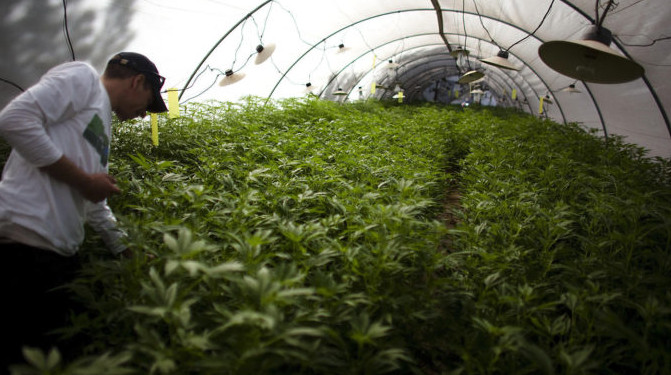Ted Dobson and other small farmers like him are hoping to be growers for Massachusetts’ recreational marijuana program. Do they stand a chance?
The brisk February wind tousling his brown curly hair, Ted Dobson stands in the middle of his 15-acre Equinox Farm in Sheffield. This is where he’s made a name for himself as one of the first organic farmers in Western Massachusetts and a pioneer in the trendy salad greens business, where he cultivates the mesclun, mustard, and Swiss chard that end up at big-name restaurants in Boston and New York. This is where, on a nice summer’s day when the farm is pulsing with energy, he says to himself: “This is your life, man. Good plan.” This is also where an unusually rainy month or excessively dry summer can mean the loss of tens of thousands of dollars in sales.
And this is where he aims to add a new crop to his rotation: cannabis. “I want to diversify,” he says with a thoughtful drawl that belies his New Jersey roots. “This is just another green I want in the mix.”
Now, with Massachusetts about to make recreational marijuana a reality, he’s ready to take that leap. Dobson hopes to be among the first agricultural cannabis growers in the state. “People who voted for legalized marijuana should have the choice of smoking good, healthy, outdoor-grown weed,” he says.
Currently, every ounce of medical marijuana sold in the state is grown under lights in windowless industrial spaces. This system consumes massive amounts of electricity and is more costly than cultivating marijuana outdoors. Traditional farmers who want to enter the medical marijuana business face huge bureaucratic, legal, and financial obstacles, and they fear that many of those same hurdles will become part of the state’s recreational program when it launches next year.
Worse still, the nascent medical marijuana industry, thanks to state rules, is dominated by a small number of well-financed companies. AmeriCann, a publicly traded Denver corporation, plans to build a million-square-foot growing facility in Freetown, near Fall River. When completed, it will be one of the largest of its kind in the country. And these existing companies will likely get first crack at recreational marijuana licenses. According to the ballot language, new cultivation operators like Dobson will have to wait a full two years after the program starts to apply for a license.
Normally thoughtful and serene, Dobson becomes infuriated when he thinks of corporations monopolizing the industry. “That’s not a fair market,” he fumes. “And most of these people are not horticulturists, not farmers; they’re just deep-pocketed folks who saw there was money to be made.”

JOANNA CHATTMAN FOR THE BOSTON GLOBE
Dobson at Equinox Farm, which supplies salad greens to the restaurant industry.
As pot loses its stigma and even historically conservative farm bureaus warm to marijuana, farmers are realizing it could be part of a productive crop rotation. “It’s always good to have a couple of high-value, labor- intensive cash crops,” says Hezekiah Allen, executive director of the California Growers Association, a statewide association of cannabis growers. “And cannabis is really a great fit for that role. It can fit into so many different farms and so many different climates and environments.”
Pot aficionados endlessly debate the relative merits of indoor- vs. outdoor-grown cannabis. Fans of the latter will cite health concerns and point out that outdoor plants benefit from natural pest control in the form of wasps and ladybugs. And Ted Dobson argues that with so many consumers preferring “high-quality, healthy food” grown under the sun in farmers’ fields, there is sure to be demand for weed raised that way.
Treating marijuana like any other crop can provide a financial boost to communities. After Colorado voters legalized cannabis in 2012, Pueblo County, a struggling rural region in the southern part of the state, allowed farmers to grow marijuana without complicated reviews or approvals. Now the county boasts a 36-acre field of cannabis behind high-security fencing, plus 21 other acres of marijuana being grown in greenhouses and indoor grow facilities. And no, says county commissioner Sal Pace, “absolutely the sky hasn’t fallen.” Instead, Pace says the county has enjoyed a boom — and collected enough tax revenue to award a scholarship to every Pueblo high school student who wishes to attend a local college.
And since growing marijuana in rural greenhouses and in open fields is far less costly than in high-tech, electricity-guzzling grow rooms on commercial or industrial real estate, the end product is cheaper. It’s why, as Colorado cannabis companies have moved their production facilities to Pueblo, statewide marijuana prices have dropped precipitously. While lower cannabis prices could end up hurting growers, marijuana, even at sharply discounted prices, could still prove a valuable addition to farmers’ fields. According to Allen, a pound of high-quality cannabis currently fetches $1,000 or more wholesale, compared with a going rate of less than a dollar for tomatoes.
credit: 420intel.com












